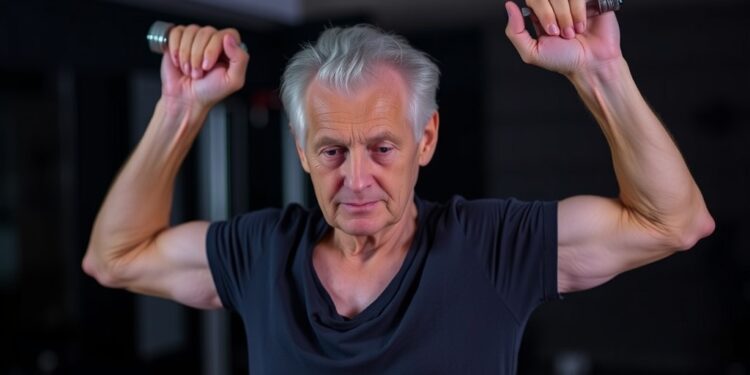
In a recent examination of the critical relationship between exercise and sleep quality, a pooled data analysis highlights the burgeoning significance of resistance and muscle-strengthening exercises in mitigating insomnia among the older population. The findings, published in the esteemed open-access journal Family Medicine and Community Health, illuminate the importance of specially tailored physical activities for enhancing sleep health among seniors, a demographic increasingly dealing with the challenges of insomnia and diminishing sleep quality as they age.
As age progresses, the natural decline in sleep quality can lead to symptoms of insomnia in nearly one in five older adults. Researchers emphasize the profound implications of subpar sleep, which can precipitate a cascade of health issues alongside cognitive impairments. Furthermore, the repercussions extend into the workplace, where inadequate rest correlates with decreased performance and increased absenteeism. This reality necessitates a concerted effort to understand the best interventions available, particularly through the lens of physical activity.
Delving into previously published research, it was evident that various forms of exercise appeared to alleviate insomnia symptoms. However, a significant gap remained in identifying which specific exercise modalities were most efficacious. Researchers set out to bridge this gap by meticulously reviewing research databases up until October 2022, seeking relevant clinical trials that scrutinized the comparative effects of physical exercise versus routine activities or health education on individuals diagnosed with insomnia. They utilized the Global Pittsburgh Sleep Quality Index (GPSQI) as a metric for assessment.
The breadth of exercise modalities examined in the study is noteworthy. The researchers categorized the activities into several types, including aerobic exercises like cycling, dancing, swimming, brisk walking, and gardening, as well as resistance exercises such as weight lifting, push-ups, and planking. Additionally, they noted balance exercises (e.g., heel-to-toe walking) and flexibility workouts featuring disciplines like gymnastics, yoga, and Pilates. They also acknowledged the impact of combination exercises, integrating multiple types of physical activity within single programs.
The rigorous analysis encompassed 24 studies totaling 2045 participants aged 60 and above, with an average age of about 70 years. Geographically, the majority of included research was conducted in Asia (56%), with smaller shares from North America (16%), South America (16%), and Europe (12%). Intriguingly, 20% of the studies took place in nursing homes, underscoring a focus on older adults in various living environments.
The intensity of the workouts varied, yet the majority were classified as mild to moderate. Participants typically engaged in sessions lasting just over 50 minutes, participating around two to three times each week. The average duration of the exercise programs spanned 14 weeks, providing enough time to identify measurable changes in sleep quality, enhancing the reliability of the findings.
However, it is essential to note that the meta-analysis primarily focused on combination and aerobic exercises due to insufficient data on other types of physical activity. Strikingly, the results indicated that combined exercise resulted in a statistically significant improvement in GPSQI scores, showcasing a 2.35-point enhancement. More compellingly, aerobic activity alone yielded a 4.35-point improvement in sleep quality, signifying its robust potential.
Through utilizing network meta-analysis—a sophisticated statistical method allowing for the amalgamation of both direct and indirect treatment effects—the researchers discovered that strength and resistance exercises eclipsed other modalities, producing an impressive 5.75-point increase in GPSQI scores. In comparison, aerobic exercises demonstrated a 3.76-point gain, while combination exercises improved scores by 2.54 points.
Additionally, when evaluating non-exercise interventions, sleep education emerged as the most effective comparator. Nevertheless, the study acknowledged that the precise content and structure of the sleep education provided were not uniformly defined across the trials, challenging the ability to draw strong conclusions on its relative efficacy against exercise.
Despite the promising results, researchers urged caution regarding the variability in design and methodologies employed across the included studies. Notably, few studies provided in-depth insights into specific exercise types, while many lacked data on exercise intensity levels, creating potential barriers to fully understanding the nuances of these findings.
Moreover, researchers recognized that certain exercises may pose challenges for older individuals due to limitations in physical capabilities. Thus, recommendations should be tailored thoughtfully, ensuring that the exercises prescribed are suitable for this demographic while still challenging enough to promote improvements in sleep quality.
In conclusion, this comprehensive analysis unequivocally supports the idea that exercise serves as a powerful tool for enhancing subjective sleep quality in older adults, particularly highlighting the significant benefits provided by resistance and aerobic exercises. As the global population continues to age, understanding the implications of physical activity on sleep health becomes increasingly crucial. Incorporating appropriate exercise interventions could lead to profound enhancements in sleep quality and overall well-being, making it a focal point in geriatric care.
Subject of Research: People
Article Title: Impact of different types of physical exercise on sleep quality in older population with insomnia: a systematic review and network meta-analysis of randomised controlled trials
News Publication Date: 4-Mar-2025
Web References: http://dx.doi.org/10.1136/fmch-2024-003056
References: Not provided
Image Credits: Not provided
Keywords: Insomnia, Physical exercise, Open access, Older adults
Tags: cognitive health and sleepcombating insomnia through exerciseexercise and sleep qualityhealth implications of insomniaimpact of exercise on insomniainsomnia management in older adultsmuscle-strengthening exercises for older adultsphysical activity interventions for insomniaresistance training for seniorssleep quality improvement strategiestailored physical activities for seniorsworkplace performance and sleep





